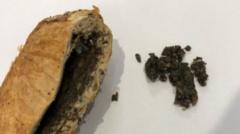In a shocking verdict, Erin Patterson, a 50-year-old woman from Morwell, Victoria, has been found guilty by a jury of murdering three of her relatives using toxic mushrooms concealed within a Beef Wellington meal. The jury also convicted her of attempting to murder the sole survivor of the ill-fated dinner held on July 29, 2023.
The trial, which attracted considerable public and media attention, revealed that Patterson had allegedly sourced death cap mushrooms from nearby towns and attempted to cover her tracks by disposing of evidence and misleading authorities. The tragic meal resulted in the deaths of Patterson’s former in-laws, Don and Gail Patterson, both aged 70, and Gail’s sister, Heather Wilkinson, aged 66. Ian Wilkinson, Heather's husband, was the only guest who survived, enduring weeks of hospitalization.
Following the verdict, the Supreme Court of Victoria released around 100 images that were shown in court as evidence. Among these were photographs of leftovers from the meal, collected from Patterson's home and analyzed for the presence of death cap mushrooms, deemed one of the deadliest fungi in the world.
During the proceedings, Patterson claimed she purchased the mushrooms dried from an Asian grocery in Melbourne but could not recall any specific details or provide receipts. Investigators, however, noted that sightings of death cap mushrooms were reported in two nearby towns leading up to the incident, with concerned locals documenting their findings on the iNaturalist platform. Intriguingly, Patterson's search history included references to these sightings.
Additionally, forensic examinations uncovered Patterson's location data suggesting she had traveled to both mushroom sighting locations and purchased a food dehydrator shortly before the incident. Despite denying ownership of the dehydrator, Patterson's fingerprints and traces of the toxic mushrooms were discovered on the recovered appliance that she discarded in a local dump just days after the meal.
The evidence presented over the trial's nine weeks culminated in a dramatic conclusion, with Patterson’s actions leading to a heartbreaking loss of life within her family. The case serves as a stark reminder of the dangers posed by toxic mushrooms and the potential for harm when malice is involved in food preparation.



















